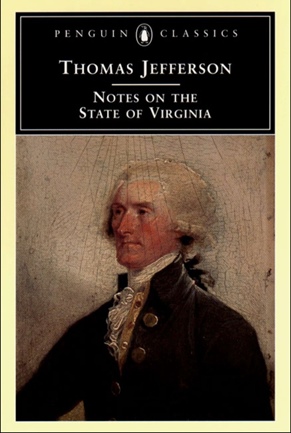Description
Jefferson’s chronicle of the natural, social, and political history of Virginia is at once a scientific discourse, an attempt to define America, and a brilliant examination of the idea of freedom.
For more than seventy years, Penguin has been the leading publisher of classic literature in the English-speaking world. With more than 1,700 titles, Penguin Classics represents a global bookshelf of the best works throughout history and across genres and disciplines. Readers trust the series to provide authoritative texts enhanced by introductions and notes by distinguished scholars and contemporary authors, as well as up-to-date translations by award-winning translators.
About the Author
Thomas Jefferson was an American statesman, diplomat, lawyer, architect, philosopher, and Founding Father who served as the third president of the United States from 1801 to 1809. He was the primary author of the Declaration of Independence. Following the American Revolutionary War and prior to becoming president in 1801, Jefferson was the nation's first U.S. secretary of state underGeorge Washingtonand then the nation's second vice president underJohn Adams. Jefferson was a leading proponent of democracy, republicanism, and individual rights, and produced formative documents and decisions at the state, national, and international levels. His writings and advocacy for human rights, including freedom of thought, speech, and religion, served as substantial inspirations to the American Revolution and subsequent Revolutionary War in which the Thirteen Colonies succeeded in breaking from British America and establishing the United States as a sovereign nation.During the American Revolution, Jefferson represented Virginia at the Second Continental Congress and served as the second governor of Virginia from 1779 to 1781. In 1785, Congress appointed Jefferson U.S. minister to France, where he served from 1785 to 1789. President Washington then appointed Jefferson the nation's first secretary of state, where he served from 1790 to 1793. During this time, in the early 1790s, Jefferson andJames Madisonorganized the Democratic-Republican Party to oppose the Federalist Party during the formation of the nation's First Party System. Jefferson and Federalist John Adams became both friends and political rivals. In the 1796 U.S. presidential election between the two, Jefferson came in second, which made him Adams' vice president under the electoral laws of the time. Four years later, in the 1800 presidential election, Jefferson again challenged Adams, and won the presidency. In 1804, Jefferson was reelected overwhelmingly to a second term.As president, Jefferson assertively defended the nation's shipping and trade interests against Barbary pirates and aggressive British trade policies, promoted a western expansionist policy with the Louisiana Purchase, which doubled the nation's geographic size, and was able to reduce military forces and expenditures following successful negotiations with France. In his second presidential term, Jefferson was beset by difficulties at home, including the trial of his former vice presidentAaron Burr. In 1807, Jefferson implemented the Embargo Act to defend the nation's industries from British threats to U.S. shipping, limiting foreign trade and stimulating the birth of the American manufacturing industry. Presidential scholars and historians praise Jefferson's public achievements, including his advocacy of religious freedom and tolerance, his peaceful acquisition of the Louisiana Territory from France, and his leadership in supporting the Lewis and Clark Expedition; they give radically differing interpretations of his views on and relationship with slavery.Jefferson is ranked by both scholars and in public opinion among the upper-tier of American presidents.
